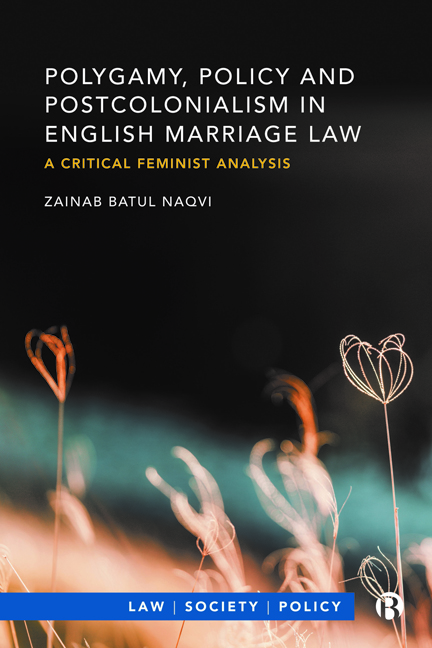Book contents
- Frontmatter
- Dedication
- Contents
- Series Editor’s Preface
- List of Cases
- List of Legislation
- Acknowledgements
- 1 Introduction: Polygamy, Law and Women’s Lives
- 2 Consciousness and Disruption in Critical Postcolonial Feminism
- 3 Polygamy in England: Tracing Legal Developments
- 4 History and Conflict of Laws in Overseas Polygamy
- 5 Tensions in Religion and Culture
- 6 Complicating Harm and Gender Equality
- 7 Religion, Recognition and Marriage Law
- 8 Final Thoughts and Reflections
- References
- Index
8 - Final Thoughts and Reflections
Published online by Cambridge University Press: 17 January 2024
- Frontmatter
- Dedication
- Contents
- Series Editor’s Preface
- List of Cases
- List of Legislation
- Acknowledgements
- 1 Introduction: Polygamy, Law and Women’s Lives
- 2 Consciousness and Disruption in Critical Postcolonial Feminism
- 3 Polygamy in England: Tracing Legal Developments
- 4 History and Conflict of Laws in Overseas Polygamy
- 5 Tensions in Religion and Culture
- 6 Complicating Harm and Gender Equality
- 7 Religion, Recognition and Marriage Law
- 8 Final Thoughts and Reflections
- References
- Index
Summary
For the West to maintain its traditional stance against polygamy does not mean that it needs to trade in all the ugly rhetoric that sometimes historically attended this stance. … We do not have to repeat the haughty and xenophobic arguments used by Graeco-Roman writers against their imperial subjects, by early Christians against Jews and Muslims, by early modern Europeans against New World natives, by nineteenth-century Americans against emancipated slaves, Native Americans, Asian workers, or traditional Mormons who practiced polygamy. The West can now simply and politely say to the polygamist who bangs on its door seeking admission or permission to practice polygamy: ‘No thank you; we don't do that here’, and close the door firmly. (Witte, 2015: 465)
These closing remarks in Witte's (2015) detailed study of polygamy and law in the West fall into the exact trap of trading in ugly rhetoric, despite claiming otherwise. As I have shown repeatedly, polygamy has been practised in the West and in England in various forms for thousands of years. Therefore, stating that the polygamist is banging on the door to seek admission and permission fails to reflect reality. Polygamists already live in the West, and they do not seek permission to be there – we only need to think about the Mormon Christian communities in North America that practise polygamy to confirm this. Even with this knowledge, polygamy is easily orientalised and racialised; it is something that only other people outside of the West do. In this book, I disrupted the misguided narratives around polygamy by providing the first contextualised account of English legal and judicial responses to this relationship using critical postcolonial feminist approaches. I demonstrated how outdated the law in this area is with the last significant legislative development happening nearly three decades ago in 1995. Marriage as we know it has been increasingly scrutinised by policymakers, scholars and laypeople and this has translated into seismic shifts in our definitions and conceptions of this institution. Still, polygamy remains on the margins both in law and in scholarship (Davis, 2010).
I undertook a closer critical and contextually driven excavation of the current legal framework which has been neglected for too long. The approach of English law to minoritised people and their ways of life needs to be examined considering the colonial context.
- Type
- Chapter
- Information
- Polygamy, Policy and Postcolonialism in English Marriage LawA Critical Feminist Analysis, pp. 186 - 195Publisher: Bristol University PressPrint publication year: 2023



